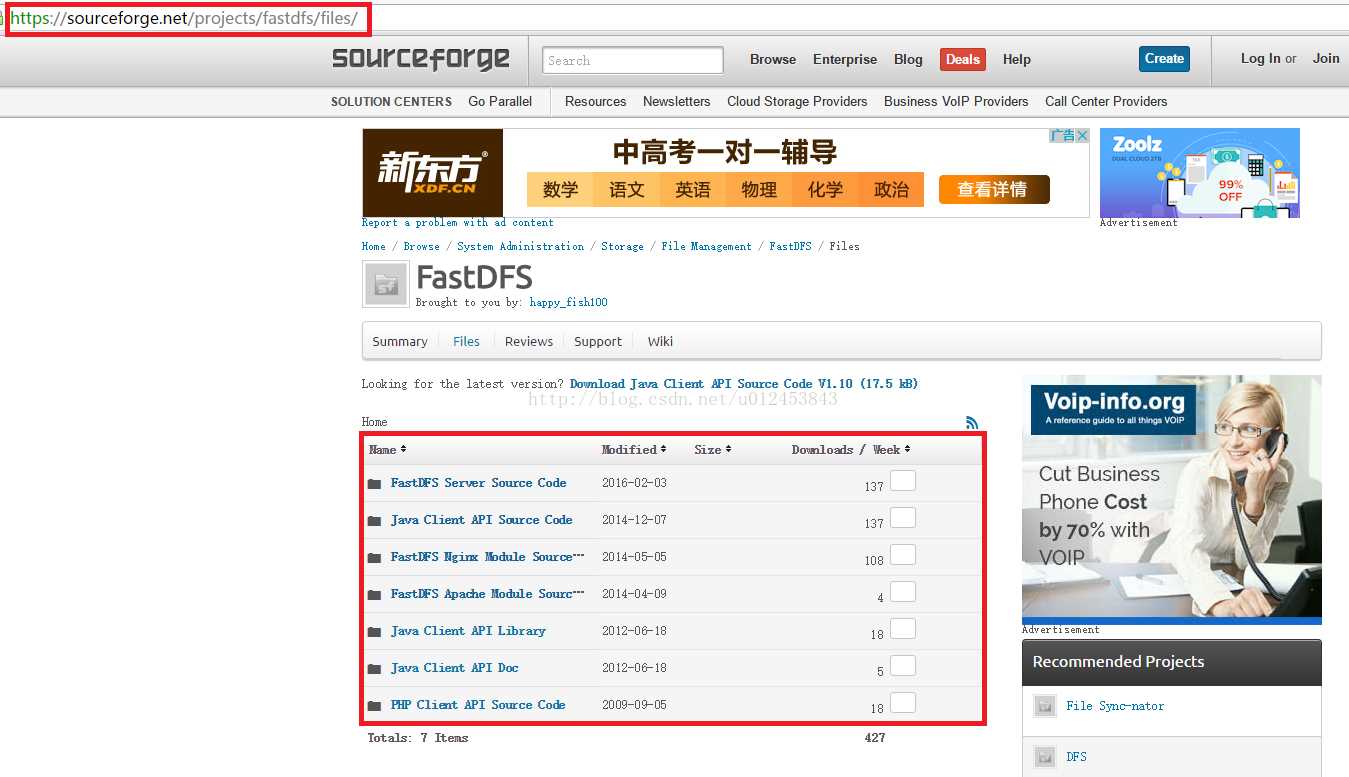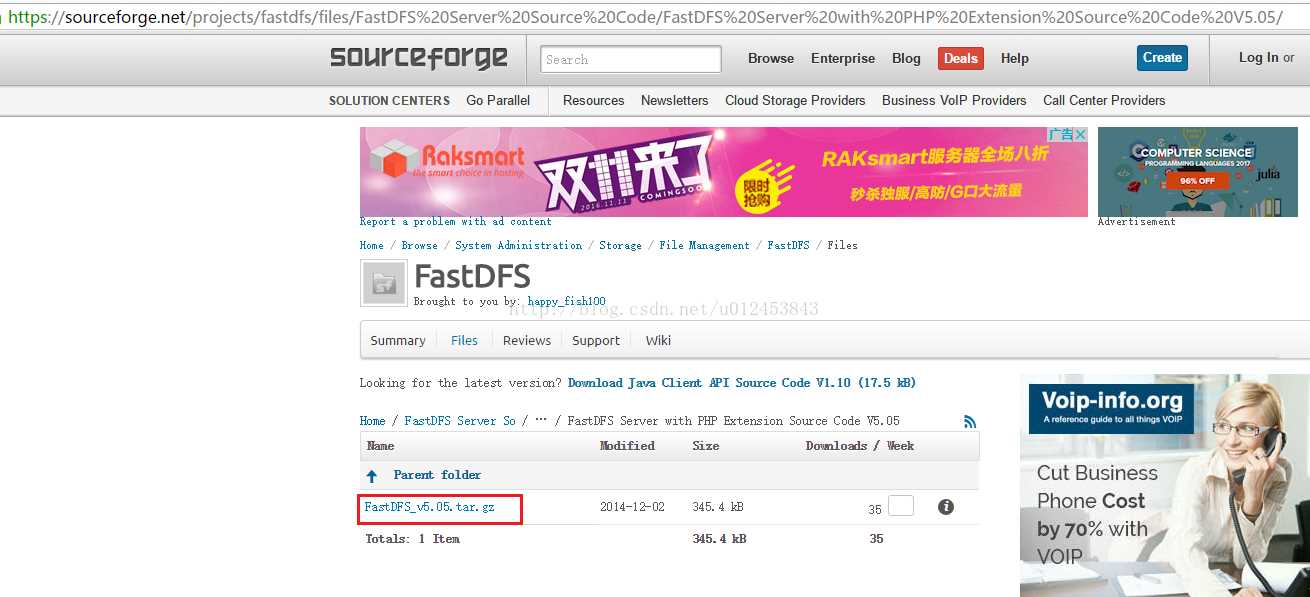目錄
- 1.軟件包
- 2.安裝gcc
- 3.安裝libfastcommon
- 4.安裝FastDFS
- 5.安裝tracker
- 6.安裝storage
- 7.測試圖片上傳
- 8.安裝Nginx�����。
- 9.安裝fastdfs-nginx-module
本文主要介紹在linux服務器如何搭建FastDFS文件服務器����。大概分為9個步驟�,由于內容較為繁瑣。下面帶你入坑�!
首先簡單介紹一下FastDFS是淘寶資深架構師余慶老師主導開源的一個分布式文件系統(tǒng),用C語言編寫���。適應與中小企業(yè)��,對文件不分塊�。
主要有Tracker(管理) 和Storage (儲存)�����。
返回路徑= 組名 /虛擬盤符{M00/00/02} /文件名

1.軟件包
下面是安裝FastDFS的安裝包
第一步:大家在瀏覽器地址欄輸入:https://sourceforge.net/projects/fastdfs/files�,我們會看到如下圖所示界面。

第二步:下載FastDFS的Server安裝包�,我們點擊上圖"FastDFS Server Source Code",會看到如下圖所示界面���,我們選擇2014-12-02那個版本,因為這個版本是最穩(wěn)定的版本����。

第三步:我們會看到如下圖所示界面���,我們點擊"FastDFS_v5.05.tar.gz"進行下載即可����。

下面是下載好的

或者是自己下載
wget https://github.com/happyfish100/libfastcommon/archive/V1.0.7.tar.gz
wget http://jaist.dl.sourceforge.net/project/fastdfs/FastDFS%20Nginx%20Module%20Source%20Code/fastdfs-nginx-module_v1.16.tar.gz
wget https://github.com/happyfish100/fastdfs/archive/V5.05.tar.gz
wget http://nginx.org/download/nginx-1.12.1.tar.gz
2.安裝gcc
檢查系統(tǒng)是否有安裝GCC
安裝GCC
yum -y install gcc gcc-c++ autoconf pcre pcre-devel make automake
yum -y install wget httpd-tools vim
就把gcc當成c語言編譯器, g++當成c++語言編譯器用就是了.(知乎)
3.安裝libfastcommon
進入libfastcommon壓縮包目錄解壓�,編譯,安裝
tar -zxvf libfastcommonV1.0.7.tar.gz
進入解壓的libfastcommon-1.0.7目錄�,編譯
安裝
最后��,libfastcommon.so文件到usr/lib下 ��,請按照自己的實際文件路徑修改被復制路徑
cp /data/fastDFS/software/libfastcommon-1.0.7/src/libfastcommon.so /usr/lib
4.安裝FastDFS
解壓FastDFS_v5.05.tar.gz��,然后編譯安裝FastDFS
tar -zxvf FastDFS_v5.05.tar.gz
./make.sh
./make.sh install
安裝成功后將目錄conf內的文件拷貝到/etc/fdfs目錄下:
cp /data/fastDFS/software/FastDFS/conf/* /etc/fdfs/
5.安裝tracker
進入/etc/fdfs目錄��,修改tracker.conf文件����。如果不存在���,就拷貝tracker.conf.sample文件為tracker.conf,然后再修改:
base_path=/home/yuqing/fastdfs >>> base_path=/home/logs/fastdfs (注解:日志文件)
http.server_port=8080 >>> http.server_port=80 (注解:端口���,80是方便默認)
store_group=group1 (注解:組名)
其中����,/home/
/fastdfs目錄如果不存在�,就創(chuàng)建一個。
之后�,就啟動tracker��,并查看是啟動成功(出現(xiàn)如下提示��,表示啟動成功):restart重啟
fdfs_trackerd /etc/fdfs/tracker.conf start
netstat -unltp | grep tracker

6.安裝storage
由于storage和tracker運行的都是fastDFS程序��,每一臺服務器都部署一臺fasfDFS����,一臺服務器是tracker�,一臺是storage
修改storage.conf文件���。如果不存在�,就拷貝storage.conf.sample文件為storage.conf�,然后再修改:
base_path=/home/yuqing/fastdfs >>> base_path=/home/logs/storage (日志路徑)
store_path0=/home/yuqing/fastdfs >>> store_path0=/home/data/storage (實際儲存文件路徑��,可以配置多個)
tracker_server=192.168.209.121:22122 >>> tracker_server=192.168.2.231:22122 (連接tracker服務器地址)
group_name=group1 (必須和tracker的組名相同)http.server_port=80 (這個端口也要改)
其中,如果/home/logs/storage和/home/data/storage不存在�����,就創(chuàng)建該目錄
然后����,就啟動storage,并查看是否成功(出現(xiàn)如下提示�����,表示啟動成功):
fdfs_storaged /etc/fdfs/storage.conf start
netstat -unltp | grep storage

最后�,查看tracker和storage是不是在通信:
fdfs_monitor /etc/fdfs/storage.conf
如下提示,出現(xiàn)ACTIVE��,表示二者均正常啟動��,至此就可以進行上傳文件測試了��。

7.測試圖片上傳
Tracker和storage都已經安裝完成,使用命令測試文件上傳:
FastDFS提供一個文件上傳命令:usr/bin/fdfs_test 測試文件上傳�����。測試上傳需要連接tracker服務器�,連接storage服務器。因此需要指定一個配置文件:client.conf配置文件�����,通過Client.conf連接tracker服務器����。
修改/etc/fdfs下client.conf
base_path=/home/logs/client (日志目錄)
tracker_server=192.168.2.231:22122 (tracker端口)
測試命令
/usr/bin/fdfs_test /etc/fdfs/client.conf upload anti-steal.jpg
如下圖返回地址則成功

8.安裝Nginx。
安裝Nginx所需的其他環(huán)境���,gcc在上面裝過了��。本人安裝沒走這一步
#gcc安裝
yum install gcc-c++
#PCRE pcre-devel 安裝
yum install -y pcre pcre-devel
# zlib 安裝
yum install -y zlib zlib-devel
#OpenSSL 安裝
yum install -y openssl openssl-devel
解壓�、編譯、安裝�。
tar -zxvf nginx-1.12.1.tar.gz
cd nginx-1.12.1
./configure
make
make install
9.安裝fastdfs-nginx-module
首先解壓fastdfs-nginx-module_v1.16.tar.gz,修改/fastdfs-nginx-module/src/config文件����。去掉所有的local(三個)

拷貝usr/lib64目錄下庫文件libfdfsclient.so
cp /usr/lib64/libfdfsclient.so /usr/lib
在nginx安裝目錄下執(zhí)行如下命令:把module添加nginx中�。通過設置安裝參數(shù)方式添加模塊。
cd nginx-1.12.1
./configure --add-module=../fastdfs-nginx-module/src
注意:我這里nginx-1.12.1和fastdfs-nginx-module在同一級目錄��,所以這樣寫

重新安裝編譯
查看Nginx的模塊
/usr/local/nginx/sbin/nginx -V
復制 fastdfs-nginx-module 源碼中的配置文件到/etc/fdfs 目錄��, 并修改
cd fastdfs-nginx-module/src
cp mod_fastdfs.conf /etc/fdfs/
進入/etc/fdfs/修改mod_fastdfs.conf如下配置����,其他默認
# 連接超時時間
connect_timeout=10
# Tracker Server
tracker_server=192.168.2.231:22122
# StorageServer 默認端口
storage_server_port=23000
# 如果文件ID的uri中包含/group**,則要設置為true
url_have_group_name = true
# Storage 配置的store_path0路徑,必須和storage.conf中的一致
store_path0=/home/data/storage
# the base path to store log files
base_path=/home/logs/storage
配置iNginx ,進入/usr/local/nginx/conf目錄下修改nginx.conf
注意:無論你在哪解壓安裝的�����。必須進這個目錄/usr/local/nginx/conf下修改nginx.conf
修改配置�,其它的默認
在80端口下添加fastdfs-nginx模塊
location ~/group([0-9])/M00 {
ngx_fastdfs_module;
}
注意下面#user nobody;改成 #user root;
#user nobody;
worker_processes 1;
#error_log logs/error.log;
#error_log logs/error.log notice;
#error_log logs/error.log info;
#pid logs/nginx.pid;
events {
worker_connections 1024;
}
http {
include mime.types;
default_type application/octet-stream;
#log_format main '$remote_addr - $remote_user [$time_local] "$request" '
# '$status $body_bytes_sent "$http_referer" '
# '"$http_user_agent" "$http_x_forwarded_for"';
#access_log logs/access.log main;
sendfile on;
#tcp_nopush on;
#keepalive_timeout 0;
keepalive_timeout 65;
#gzip on;
server {
listen 80;
server_name 192.168.2.231;
location ~/group([0-9])/M00 {
ngx_fastdfs_module;
}
#charset koi8-r;
#access_log logs/host.access.log main;
location / {
root html;
index index.html index.htm;
}
#error_page 404 /404.html;
# redirect server error pages to the static page /50x.html
#
error_page 500 502 503 504 /50x.html;
location = /50x.html {
root html;
}
# proxy the PHP scripts to Apache listening on 127.0.0.1:80
#
#location ~ \.php$ {
# proxy_pass http://127.0.0.1;
#}
# pass the PHP scripts to FastCGI server listening on 127.0.0.1:9000
#
#location ~ \.php$ {
# root html;
# fastcgi_pass 127.0.0.1:9000;
# fastcgi_index index.php;
# fastcgi_param SCRIPT_FILENAME /scripts$fastcgi_script_name;
# include fastcgi_params;
#}
# deny access to .htaccess files, if Apache's document root
# concurs with nginx's one
#
#location ~ /\.ht {
# deny all;
#}
}
# another virtual host using mix of IP-, name-, and port-based configuration
#
#server {
# listen 8000;
# listen somename:8080;
# server_name somename alias another.alias;
# location / {
# root html;
# index index.html index.htm;
# }
#}
# HTTPS server
#
#server {
# listen 443 ssl;
# server_name localhost;
# ssl_certificate cert.pem;
# ssl_certificate_key cert.key;
# ssl_session_cache shared:SSL:1m;
# ssl_session_timeout 5m;
# ssl_ciphers HIGH:!aNULL:!MD5;
# ssl_prefer_server_ciphers on;
# location / {
# root html;
# index index.html index.htm;
# }
#}
}
注意:
listen 80 端口值是要與 /etc/fdfs/storage.conf 中的 http.server_port=80 (前面改成80了)相對應。如果改成其它端口�,則需要統(tǒng)一,同時在防火墻中打開該端口��。
location 的配置���,如果有多個group則配置location ~/group([0-9])/M00 ��,沒有則不用配group��。
在文件存儲目錄下創(chuàng)建軟連接�����,將其鏈接到實際存放數(shù)據(jù)的目錄,注意這個文件存儲的位置后面多個data目錄是系統(tǒng)自動生成的
ln -s /home/data/storage/data /home/data/storage/data/M00
啟動nginx
#啟動nginx
cd /usr/local/nginx/sbin/
./nginx 直接啟動/usr/local/nginx/sbin/nginx
#設置開機啟動
vim /etc/rc.local
/usr/local/nginx/sbin/nginx
# 設置執(zhí)行權限
chmod 755 rc.local
查看Nginx是否啟動
OK記得云服務的安全組 和防火墻設置需要方通 80�、22122��、 23000 這個不會的請參考騰訊云服務器tomcat端口無法訪問 中的防火墻設置
在地址欄中訪問成功 http://192.175.231.128/group1/M00/00/00/rBAACVzBeU2AQBKJAAOHDqS1H9o350.jpg

報錯��!不存在的���。有問題110,120,119
注意:
1.group2同組的Storage2和Storage3 FastDFS服務端口必須一致: port=23000����。
2.一臺服務器可以裝多個組(group)但不能裝同組的多個Storage,日志會報錯誤,日志報錯原因是"注意1"
3.Version 4.05之前fastdfs內部綁定了libevent作為http服務器.Version 4.05之后的版本刪除了內置的web http服務��,內置的web http服務是個累贅���,不用也罷���!
4.啟動storage server時����,一直處于僵死狀態(tài).啟動storage server����,storage將連接tracker server��,如果連不上,將一直重試����。直到連接成功,啟動才算真正完成!如果集群中有2臺tracker server���,而
其中一臺tracker沒有啟動�����,可能會導致storage server一直處于僵死狀態(tài)�����。
到此這篇關于linux搭建FastDFS文件服務器的實現(xiàn)步驟的文章就介紹到這了,更多相關linux搭建FastDFS文件服務器內容請搜索腳本之家以前的文章或繼續(xù)瀏覽下面的相關文章希望大家以后多多支持腳本之家���!